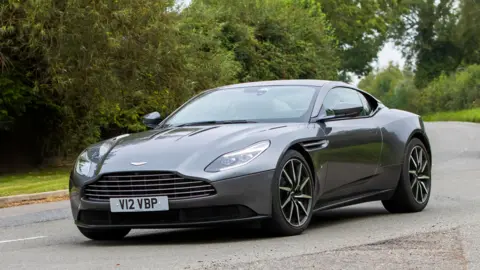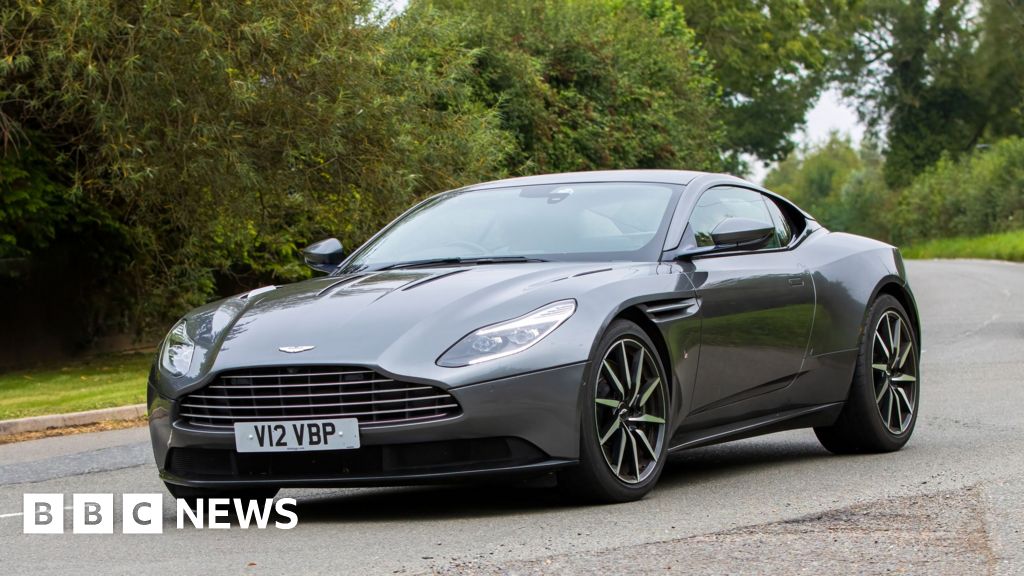 Getty Images
Getty ImagesLuxury carmaker Aston Martin’s share price sank more than 20% after it said profits will be lower than expected this year.
The company, famed for its links to fictional superspy James Bond, has been hit by supply chain issues and falling sales in China.
The share price of Stellantis, the owner of brands such as Peugeot, Citroen, Fiat and Jeep, also plummeted on Monday after a profit warning.
Carmakers across Europe have been suffering lately, with disappointing sales and increased competition from abroad taking a heavy toll on earnings.
Aston Martin is a prestige brand which makes upmarket cars in relatively small quantities.
Last year, it sold 6,620 vehicles, with about a fifth of those going to the Asia-Pacific region.
However, the company says it has been hit by a fall in demand in China, where a slowing economy has affected sales of luxury cars.
It has also been affected by problems at a number of suppliers, which have affected its ability to build a number of new models.
As a result, Aston says it will make about 1,000 fewer cars than originally planned this year.
Sales, which had originally been forecast to rise, are now expected to be lower than in 2023, and earnings will fall short of current market expectations.
Adrian Hallmark, who became Aston Martin’s chief executive a few weeks ago, said it had become clear that “decisive action” was needed to adjust output.
But he added that he was “even more convinced than before” about the brand’s potential for growth.
Industry giants suffering
Meanwhile, Stellantis has become the latest large-scale carmaker to revise its financial forecasts, thanks to a deterioration in the industry outlook.
The company has been struggling with weak demand in the US, a key market, where it has been forced to offer discounts in order to shift unsold stock.
It has also been facing increased competition from Chinese brands, which have been expanding aggressively abroad.
As a result, it said it expects its profit margins to be significantly lower than previously thought this year.
The announcement sent its shares tumbling. By lunchtime on Monday, the price was down more than 14%.
The problems at Stellantis and Aston Martin reflect a wider malaise in the European car industry.
On Friday, Volkswagen issued its second profit warning in three months, while it has also suggested it might have to close plants in Germany for the first time in its history.
Its German rivals Mercedes-Benz and BMW have also downgraded their profit forecasts in recent weeks.
Among the common issues are falling sales in China – until recently a highly lucrative market for expensive and profitable high-end models – coupled with growing competition from Chinese brands in other markets.
According to Matthias Schmidt of Schmidt Automotive Research, European firms have been caught out by a wave of “unsustainable” discounting by Chinese brands in their home market, which has affected sales of high-priced vehicles.
“German brands, and VW in particular, have been caught off-guard by the pace of change in China” he explains.
EV sales falter
Sales of electric cars, which manufacturers have invested huge sums in developing, have been faltering badly in Europe.
According to data from the European Automobile Manufacturers Association, sales of battery-powered cars were down nearly 44% in August compared to the same period a year ago, while their share of the market dropped to 14.4%, compared to 21% in 2023.
The decline has followed the removal or reduction of incentives for electric car buyers in a number of European markets, including France and Germany.
On Friday, EU nations are due to vote on plans to impose steep tariffs on imports of electric vehicles from China.
The measures are designed to protect local producers from unfair competition. The European Commission claims Chinese manufacturers benefit from illegal subsidies from the Chinese government – and believes tariffs will create a level playing field.
But the plan is controversial, and has received a mixed reception from manufacturers.


